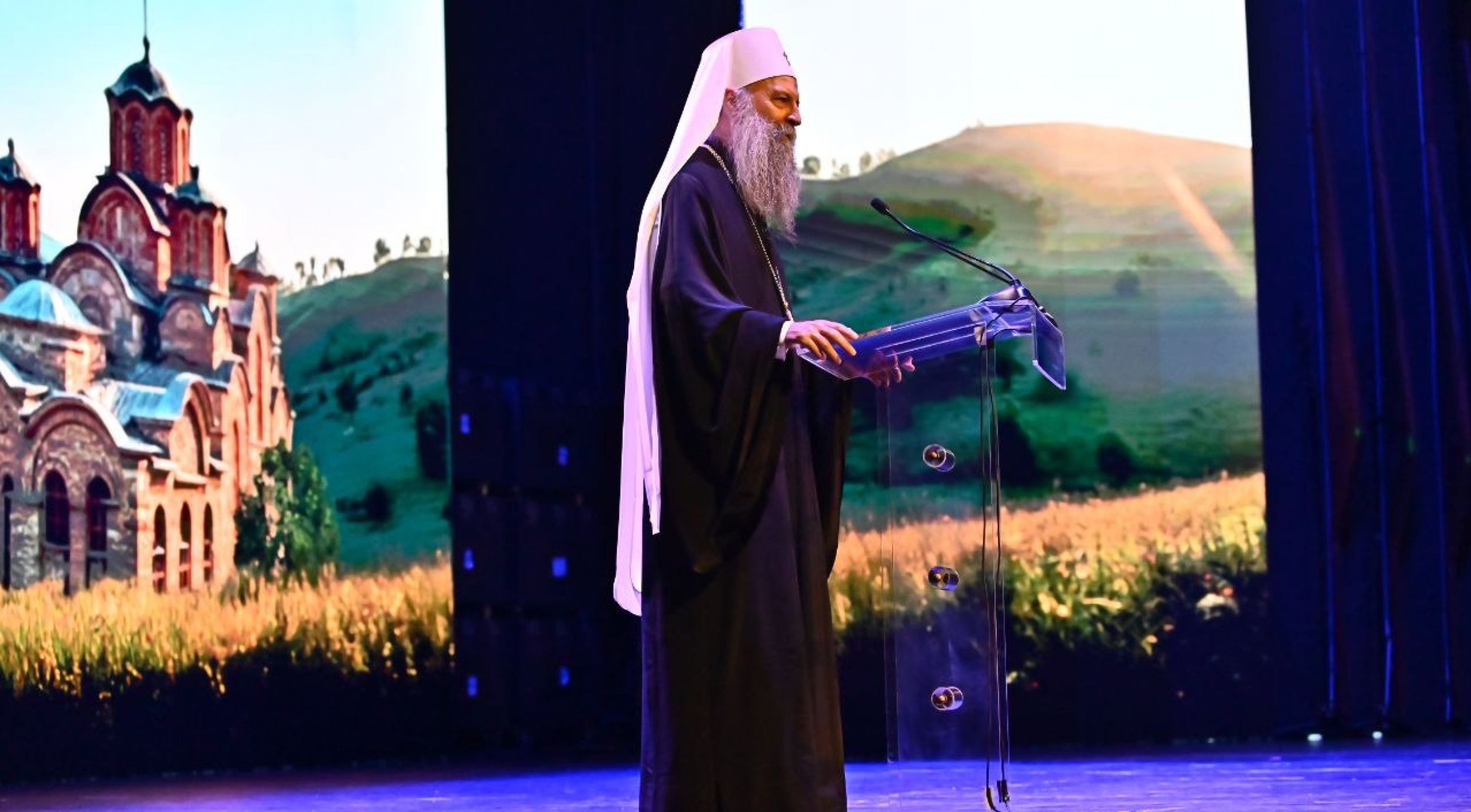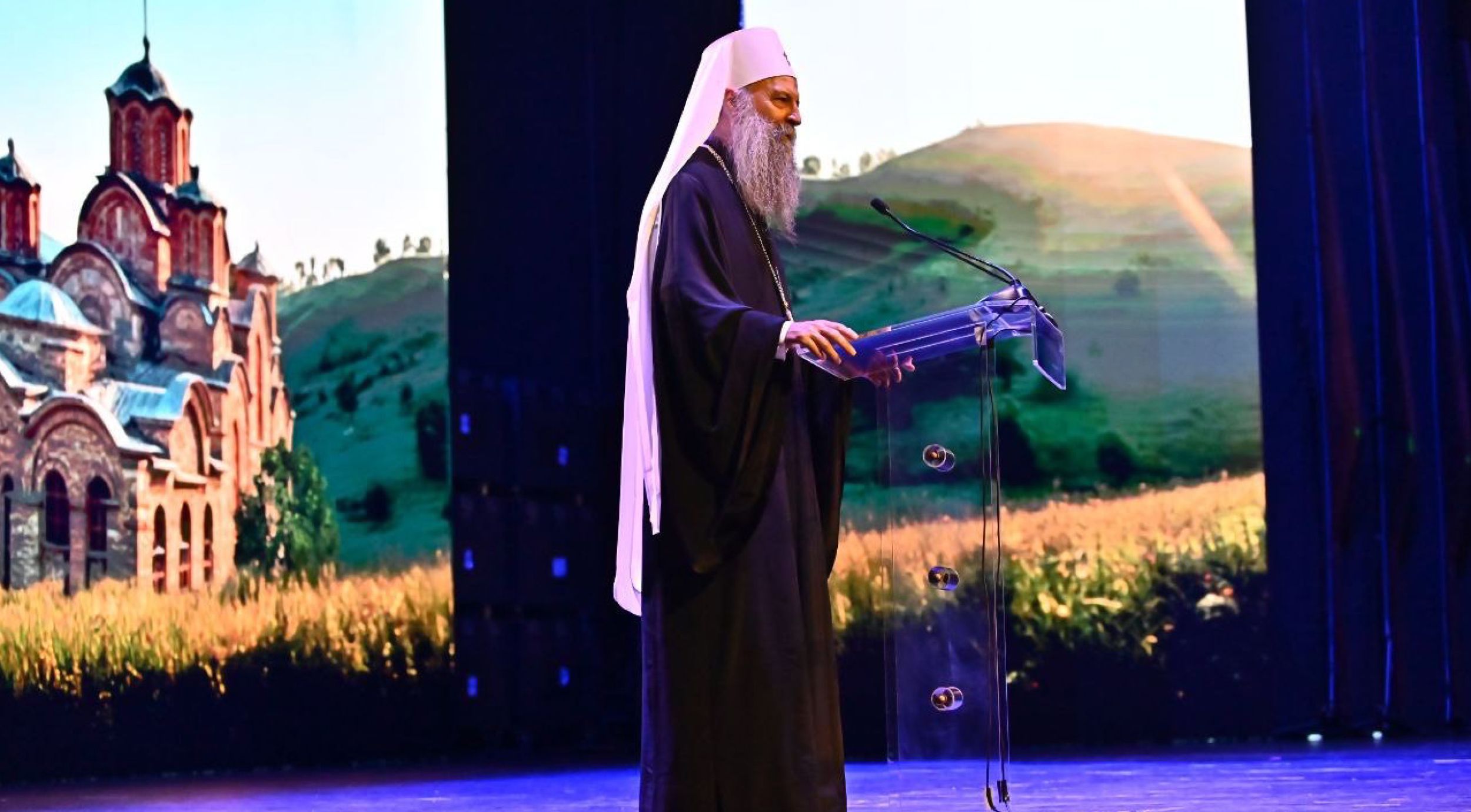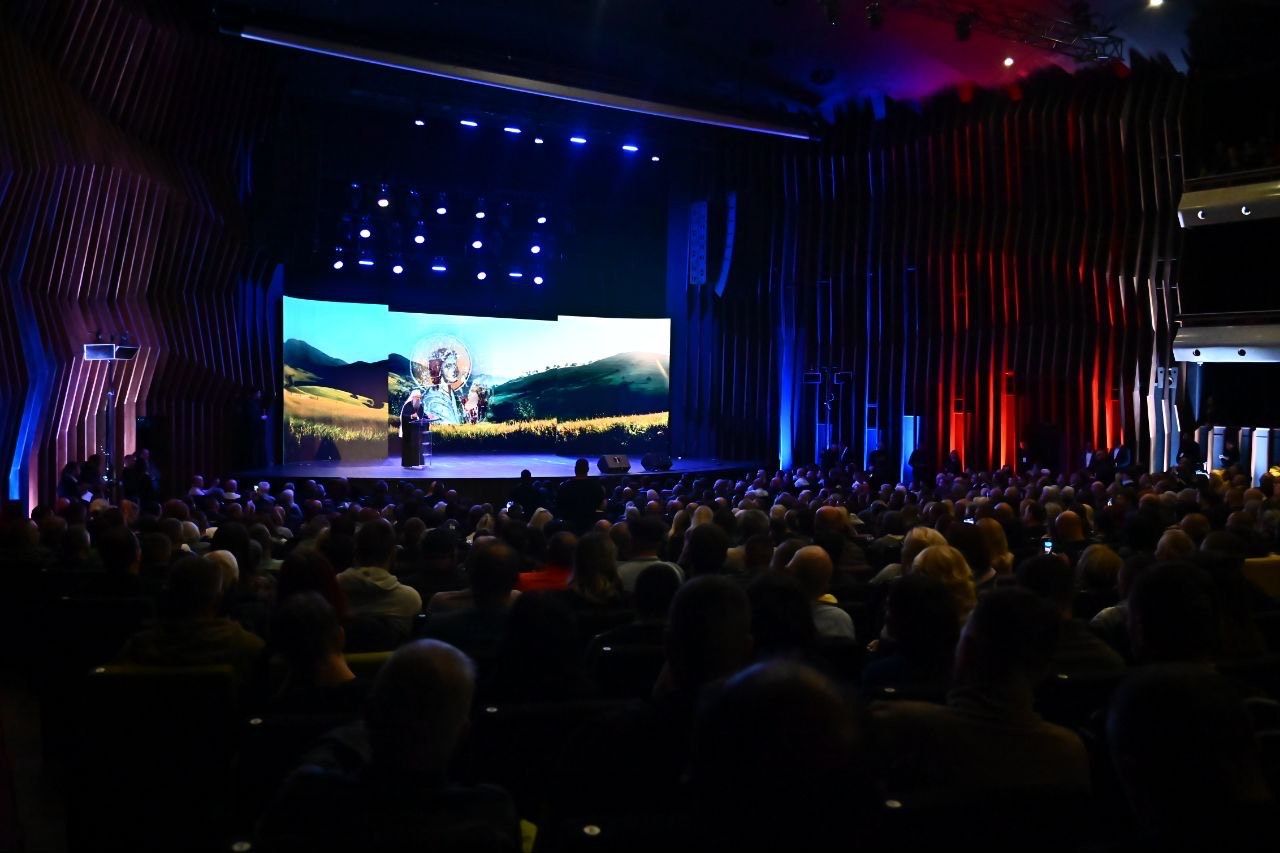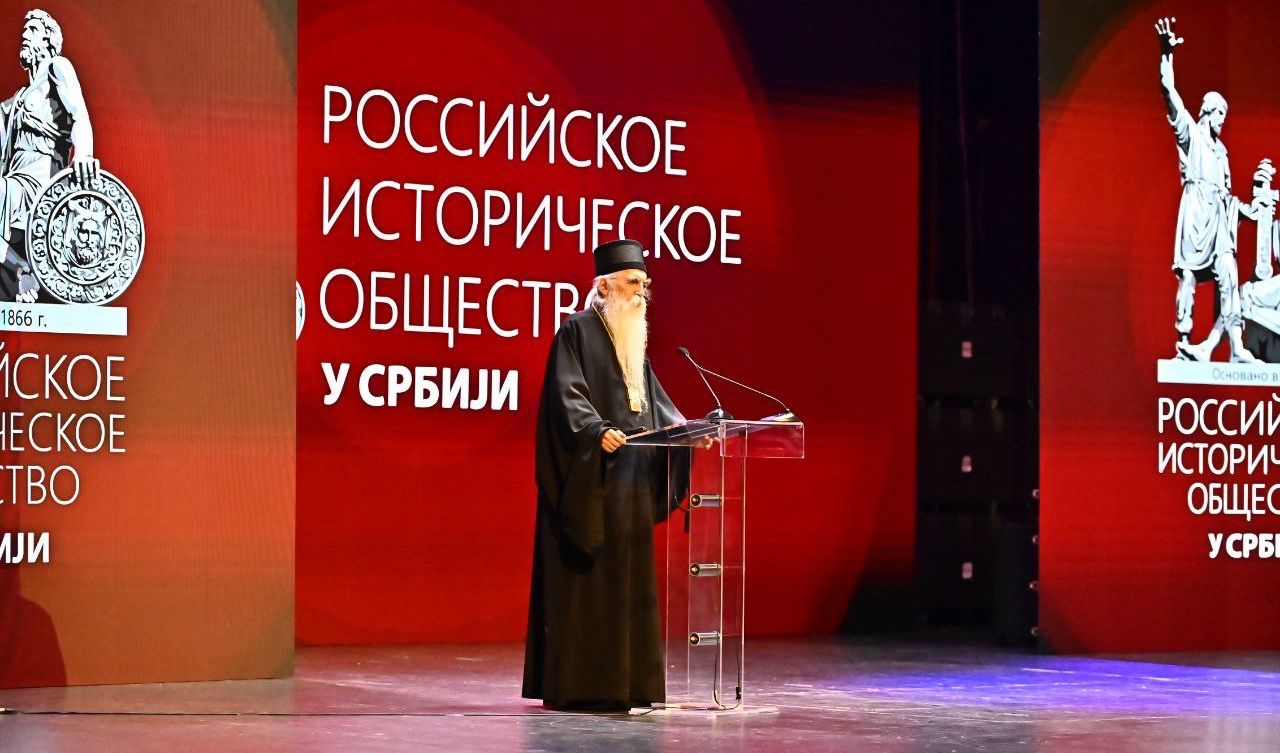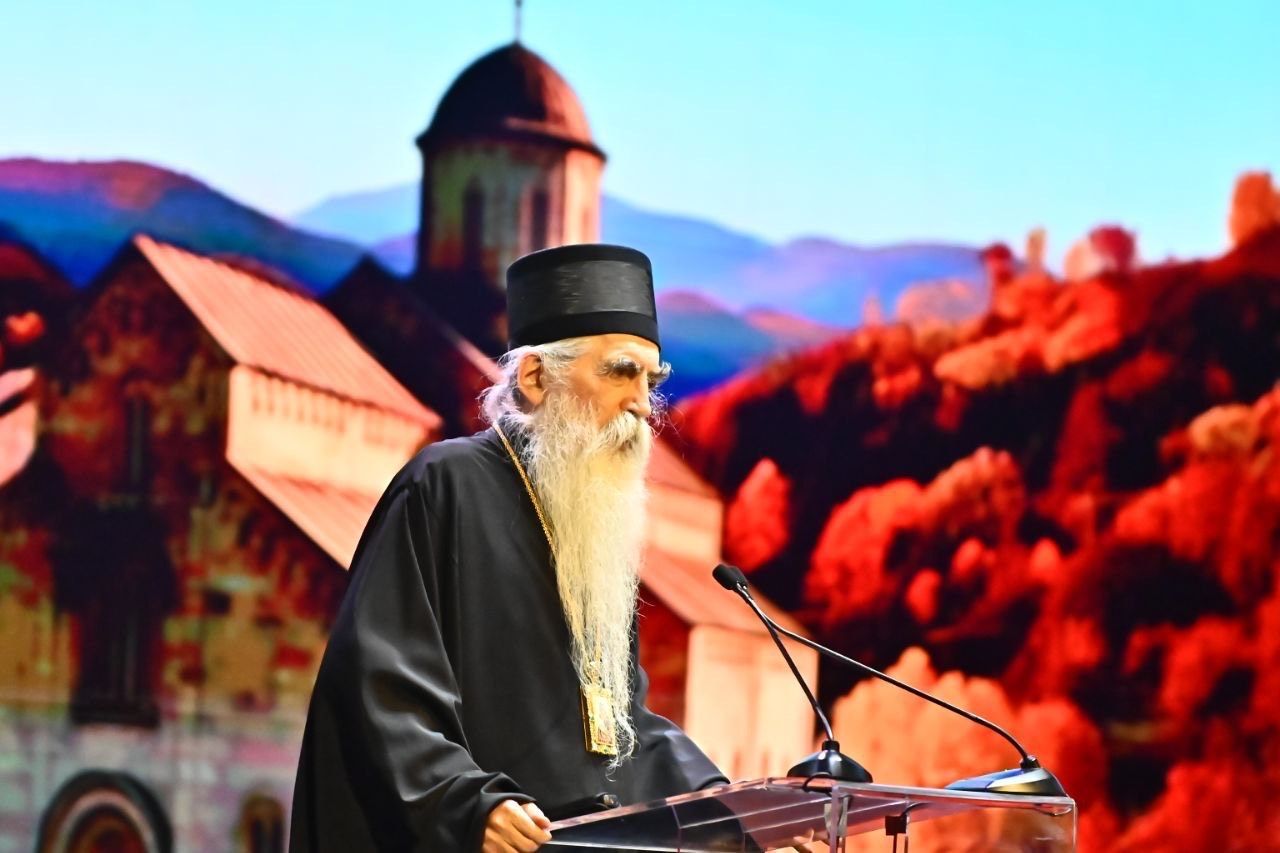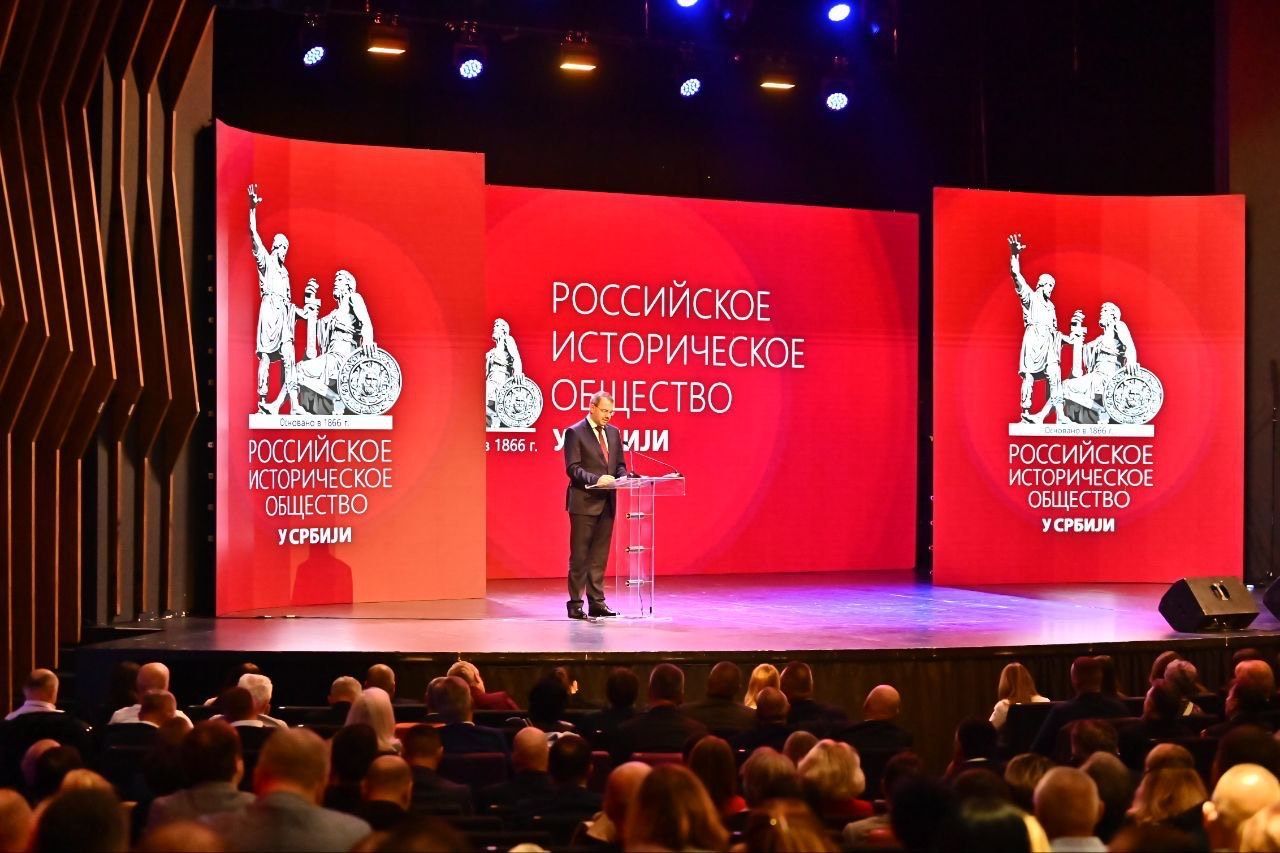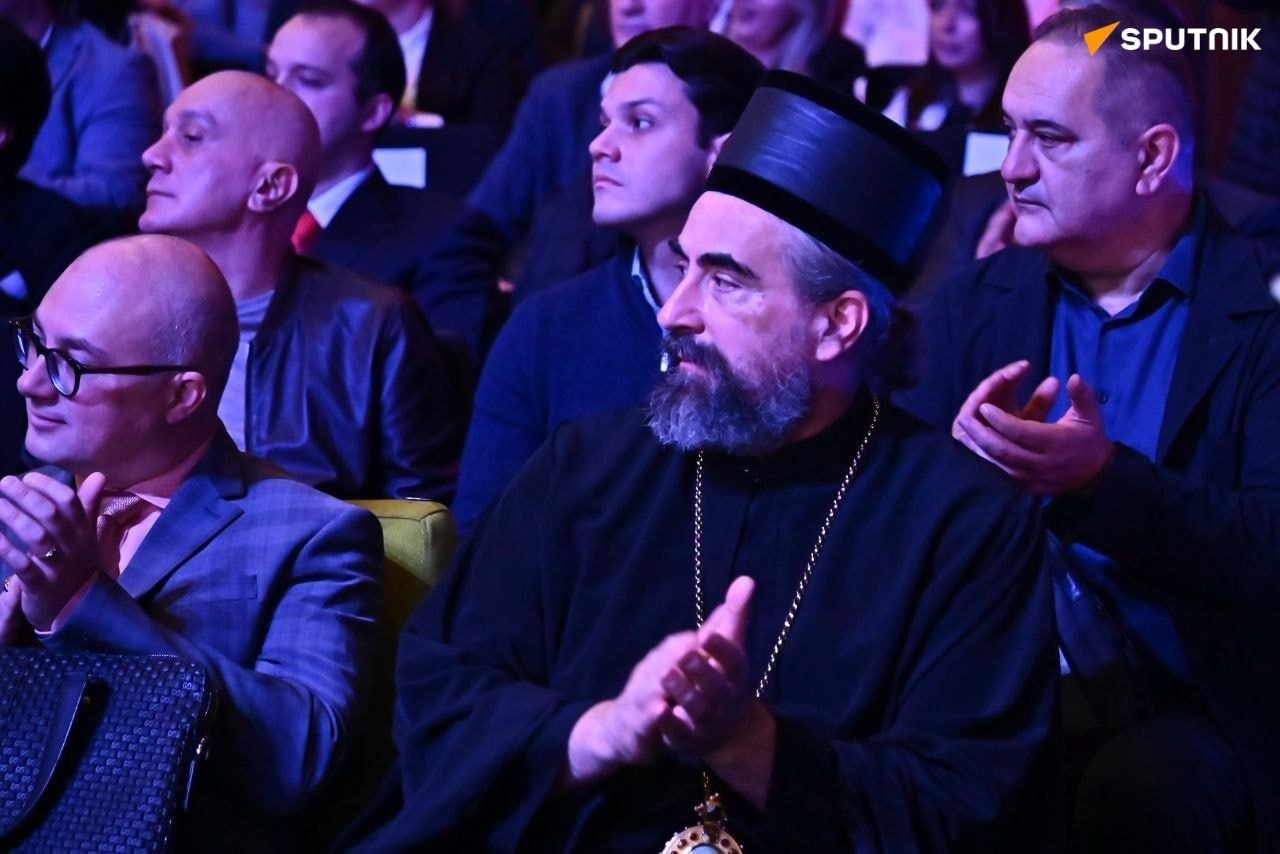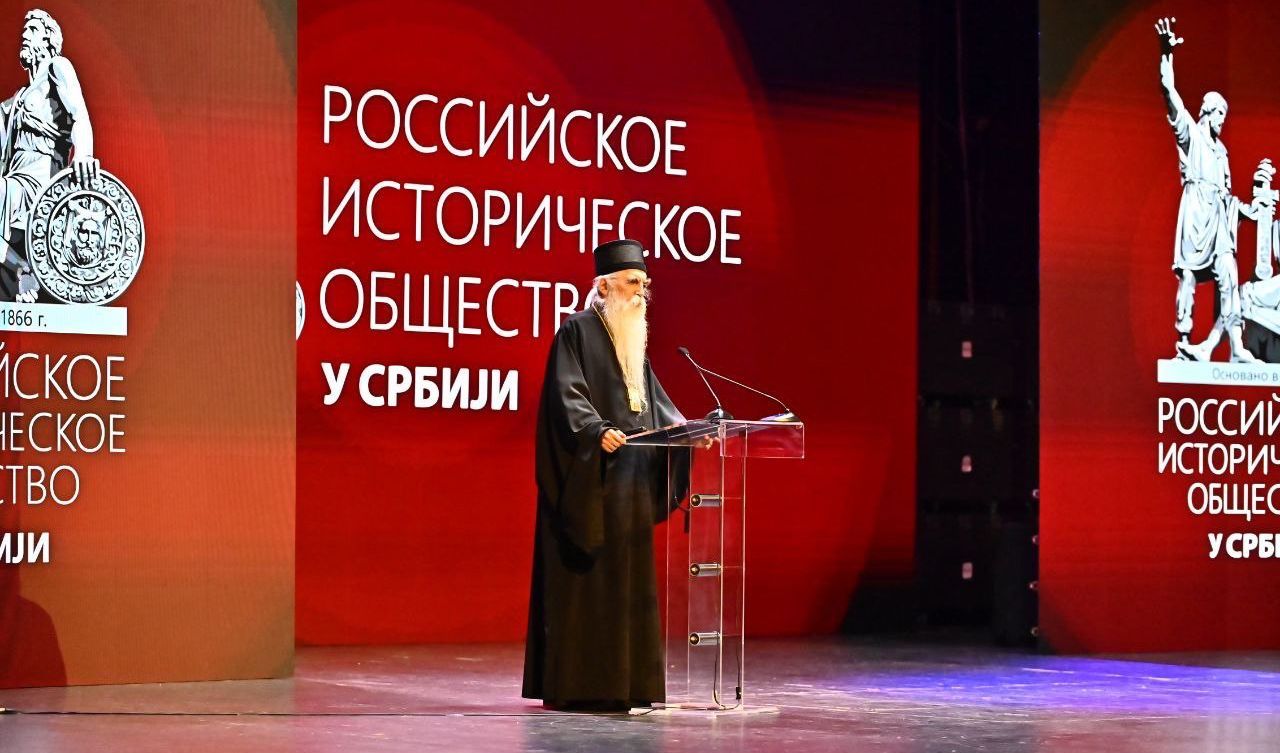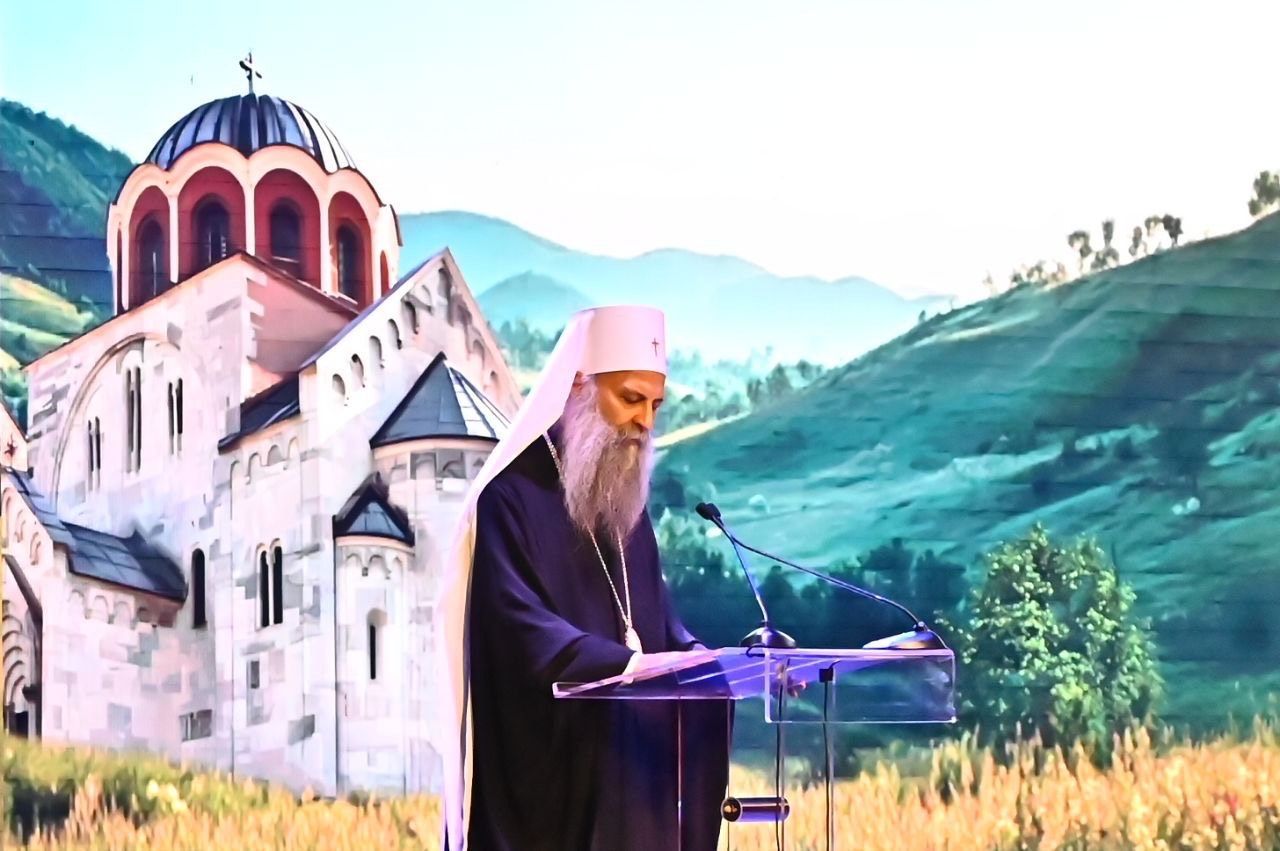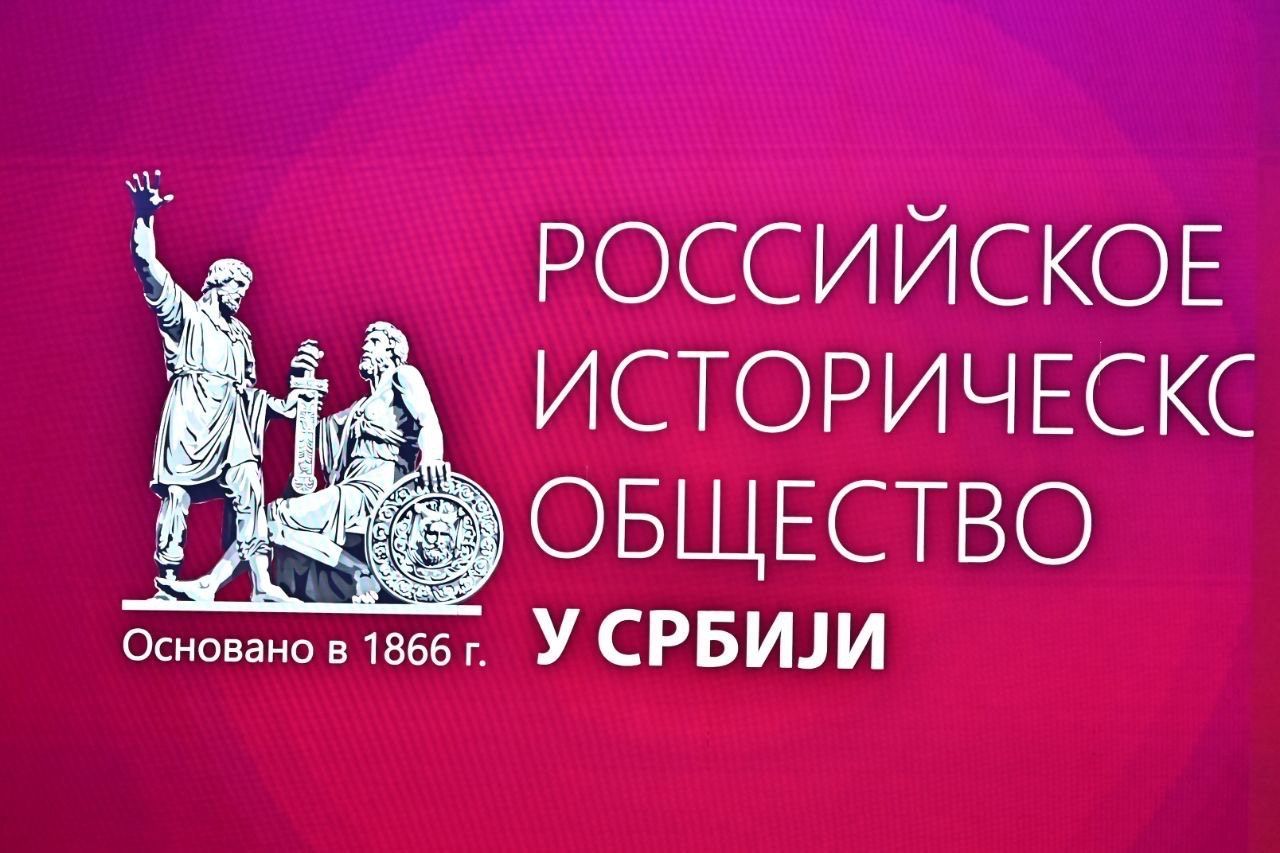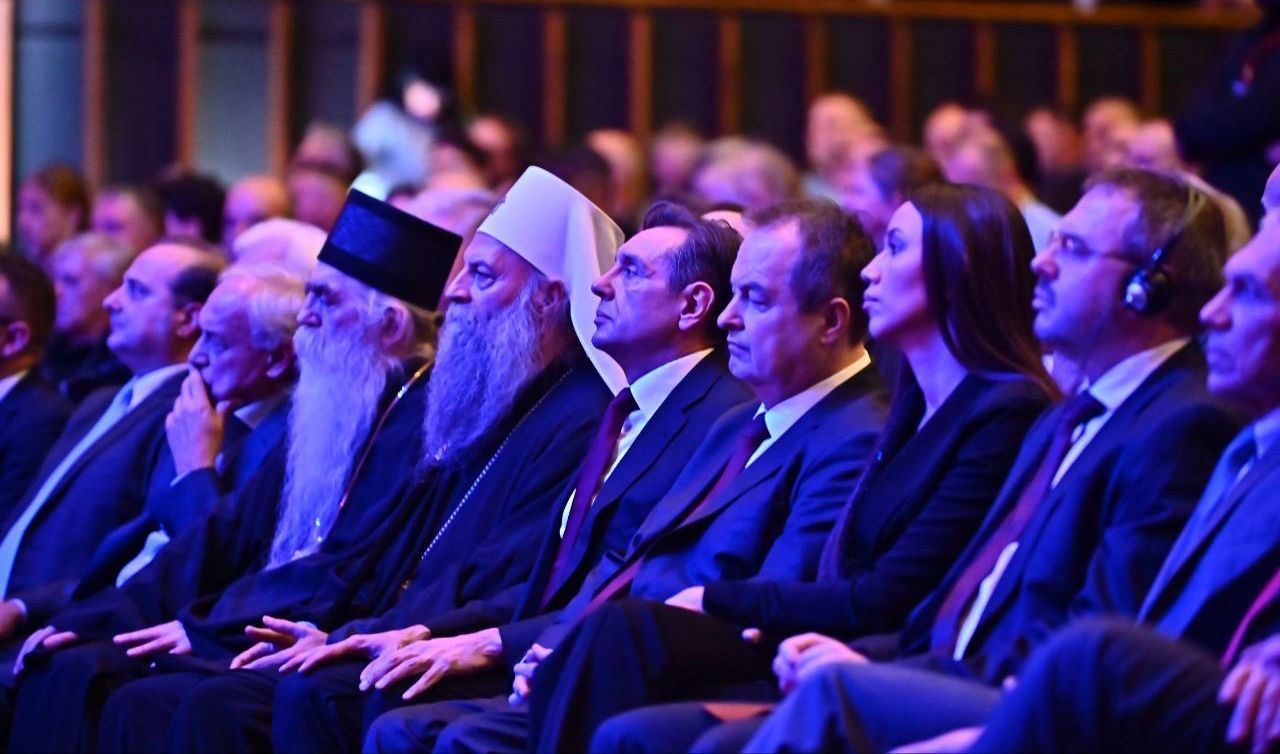Patriarch Porfirije and Metropolitan Irinej at the Founding Assembly of the Russian Historical Society in Serbia
His Holiness Serbian Patriarch kyr Porfirije and His Eminence Metropolitan of Bačka kyr Irinej took part, on 26 October 2025, in the work of the Founding Assembly of the Russian Historical Society in Serbia. We bring their addresses in full:
Greeting Address of His Holiness Serbian Patriarch kyr Porfirije
Your Eminences, Your Excellencies, honorable representatives of the Russian people, dear brothers and sisters,
It is a great honor and sincere pleasure for me to greet you, first in my own name, but also on behalf of all those who carry in their hearts the centuries-old sense of closeness between Serbia and Russia.
We have gathered here today not only to commemorate true friendship, but also to reaffirm and seal the covenant left to us by our ancestors and predecessors. In this spirit, the ceremonial opening of the institution of the Russian Historical Society in Serbia represents a confirmation of the continuous spiritual connection between the Serbian and Russian peoples, who have lived in harmony and kinship throughout history and who, God willing, will continue to do so in the future.
Considering the role of history in the context of two well-known sayings: History is the teacher of life and History is written by the victors – which are nevertheless products of relative human reasoning, the Serbians and the Russians, as a people of the same Orthodox faith, language, and blood, rely upon the unquestionable divine judgment of Christ as the measure of truth.
In a time of dreadful historical revisionism, of which we are all witnesses, when facts are neglected and interpretations become decisive, the initiative to establish such an institution as the Russian Historical Society in Serbia seems to us of key importance. We firmly believe that its work will not only advance the existing spiritual, cultural, and other bonds between our peoples but also ensure that truth does not become a captive within the geographical and cultural space we share with others, but remains a living testimony to Christ’s words: The truth shall make you free (John 8:32).
I take this opportunity once again to extend my heartfelt congratulations on the founding of the Russian Historical Society in our country, to invoke God’s blessing, and to wish this institution success in its future work – an institution that is, quite simply, a natural outcome and result of the nurtured spiritual ties between the Serbian and Russian peoples, and a guarantor of the authenticity of the historical facts it will preserve.
Address of His Eminence Metropolitan of Bačka kyr Irinej
Your Holiness, esteemed officials and all those present, each according to your rank and dignity, brothers and sisters,
I am grateful to God and deeply joyful in my soul for the undeserved honor of participating, and moreover, of saying a few words at this honorable gathering and at this distinguished venue, on the occasion of the establishment and, in effect, the beginning of the public activity of the Russian Historical Society in Serbia – in practice, I would say, a Russian-Serbian society dedicated to discovering, studying, and promoting the common history of our two brotherly nations and our two sister Orthodox Churches.
As I understand it, the activity of this Society does not simply mean a “re-reading” of historical sources – that is, a new interpretation of acts and facts, more or less already known – nor merely the possible discovery of those hitherto unknown. Rather, it implies an attempt to penetrate the phenomenologically invisible yet ontologically decisive, essential, metaphysical (that is to say: religious, spiritual-cultural, and civilizational – in one word, profoundly identity-related) sources and currents of historical processes, both in the centuries-long life and shared experience of our Churches and peoples and in the life and experience of the entire human race – that is, of our broader family.
If I correctly understand the true meaning of the forthcoming activity of this conciliar Russian-Serbian, or Serbian-Russian, beneficial endeavor, then I dare, before you – the spiritual children of the Orthodox Church (Russian or Serbian, it makes no difference) – and dear friends (Serbians or Russians, it makes no difference) – to express my humble conviction that our future generations, until the end of history, will have no moral right to bring this undertaking – now begun in the name of the Lord and with unshakable hope in His help – to an end, declaring it unnecessary or, worse still, meaningless.
Your Holiness, bless me – and all of you, brothers and sisters, allow me – to briefly share a few more of my modest personal reflections on this subject, fully aware that some of my thoughts represent loci communes, commonplaces familiar to all of you, yet always important and worthy of repetition, in the spirit of the timeless classical maxim: Repetitio est mater studiorum (“Repetition is the mother of learning”), which should always be understood and interpreted within the broader and more comprehensive maxim: Historia est magistra vitae (“History is the teacher of life”). Yet with the crucial note that we – Russians and Serbians, with Serbias perhaps more so than Russians – are eternal repeaters in the examination of history, the “teacher of life.” The Russian answer in that examination of history could be summed up as follows: we failed the test, but we passed the retake. Our Serbian answer, it seems to me, might be: we failed the test, but we do not lose hope that in the forthcoming retake we will somehow improve our failing grade before the Church, our national and personal conscience, history, and, above all, before the justice of God.
The organic bonds and, even more than that, the fellowship and mutual permeation of Serbians and Russians date back to ancient times, to the epoch of the great community of Slavic tribes dispersed across the vast areas of Eastern and Northern Europe as well as Western Asia. Later, after the great migrations of peoples, when tribes became nations and dialects became languages, and when the Serbians were already the largest Slavic community in the south of Europe (while we must not forget the decimated yet still living Lusatian Serbians in the north), these bonds and that fellowship did not cease. The historically documented ancient trade route from the Varangians to the Greeks passed through the newly formed Serbian territories and, later, states in Southeastern Europe. After the Baptism of the Rus’ under the holy and great Prince Vladimir of Kiev, the spiritual, ecclesiastical, cultural, and other Russian ties with the Roman (Byzantine) world, or the “Byzantine Commonwealth”, became increasingly strong, not so much directly as indirectly, through the South Slavs, already integrated into the Eastern Roman oikoumene (οἰκομένη), first and foremost through the Serbians.
Hence it is no wonder that the young prince Rastko Nemanjić, later Saint Sava, the first Archbishop and Enlightener of the Serbian people, departed for the Holy Mount Athos with the help of a Russian monk whose name we do not know, and that he remained forever in the Russian monastery of Rusikon on the Holy Mountain. We must not neglect, much less forget, the subsequent spiritual, cultural, and even state-forming currents that flowed from the Serbian South toward the Russian North, among which I particularly emphasize the Zakonopravilo (Nomocanon, “Krmčija”) of Saint Sava.
Later came the repeated, manifold and invaluable gifts of Russia to us, the “poor Serbs,” throughout the centuries of Ottoman yoke, during the Serbian uprisings for liberation from Karađorđe onward, in the Balkan wars for freedom, in the First World War (into which Imperial Russia, then weak and unprepared for war, entered in order to save its brotherly Serbia), in the Second World War (at whose end our liberation from the Nazi German occupier was brought not by Josip Broz Tito [“whose father and mother are unknown, and what is said of them is but a fable,” as the late Igumen Makarije of Dečani once said] – who entered Belgrade about ten days before the Russians, or Soviets, it is all the same – but by the enormous Soviet army of 300,000 soldiers under Tolbukhin), and all the way to the present day, when we survive as a more or less independent state, first and foremost by the grace of God, and then, again and again, thanks to the Russian people and the Russian state, not forgetting, of course, our great friendly China, while “honoring with silence” the so-called “Yeltsin-era Russia,” which was unable to help even itself, let alone us.
Allow me to conclude briefly and clearly, by repeating the words of our late Patriarch Irinej – that upon the stormy sea of the modern age we must sail as a “small Serbian skiff, tied to the great Russian ship.” In doing so, we harbor ill will toward none, much less enmity, yet we make a clear distinction between those who, at regular intervals, occupy or at the very least bomb us, and those who, in all historical circumstances, have always come to our aid in a brotherly way and, objectively speaking, have saved us. From the depths of my soul, I pray that the Lord Christ, the only Lover of mankind, be merciful to both the former and the latter, and, along with them, to us, the “poor Serbs.” Thank you all for your kind attention.
***
At the founding assembly held in the MTS Hall in Belgrade, the attendees were also addressed by Mr. Aleksandar Vulin, Chairman of the Council of the Representation of the Russian Historical Society in Serbia; Mr. Konstantin Mogilevsky, Secretary of the Russian Historical Society and Deputy Minister of Science and Higher Education of the Russian Federation; H.E. Mr. Aleksandr Botsan-Kharchenko, Ambassador of the Russian Federation; and historian Prof. Dr. Aleksandar Raković. A video message was delivered by Mr. Sergey Naryshkin, President of the Russian Historical Society and Director of the Foreign Intelligence Service of the Russian Federation. The assembly was attended by numerous figures from political and public life, among them His Eminence Metropolitan of Budimlje-Nikšić kyr Metodije and Mr. Ivica Dačić, Deputy Prime Minister and Minister of Internal Affairs.
Greeting Address of His Holiness Serbian Patriarch kyr Porfirije
Your Eminences, Your Excellencies, honorable representatives of the Russian people, dear brothers and sisters,
It is a great honor and sincere pleasure for me to greet you, first in my own name, but also on behalf of all those who carry in their hearts the centuries-old sense of closeness between Serbia and Russia.
We have gathered here today not only to commemorate true friendship, but also to reaffirm and seal the covenant left to us by our ancestors and predecessors. In this spirit, the ceremonial opening of the institution of the Russian Historical Society in Serbia represents a confirmation of the continuous spiritual connection between the Serbian and Russian peoples, who have lived in harmony and kinship throughout history and who, God willing, will continue to do so in the future.
Considering the role of history in the context of two well-known sayings: History is the teacher of life and History is written by the victors – which are nevertheless products of relative human reasoning, the Serbians and the Russians, as a people of the same Orthodox faith, language, and blood, rely upon the unquestionable divine judgment of Christ as the measure of truth.
In a time of dreadful historical revisionism, of which we are all witnesses, when facts are neglected and interpretations become decisive, the initiative to establish such an institution as the Russian Historical Society in Serbia seems to us of key importance. We firmly believe that its work will not only advance the existing spiritual, cultural, and other bonds between our peoples but also ensure that truth does not become a captive within the geographical and cultural space we share with others, but remains a living testimony to Christ’s words: The truth shall make you free (John 8:32).
I take this opportunity once again to extend my heartfelt congratulations on the founding of the Russian Historical Society in our country, to invoke God’s blessing, and to wish this institution success in its future work – an institution that is, quite simply, a natural outcome and result of the nurtured spiritual ties between the Serbian and Russian peoples, and a guarantor of the authenticity of the historical facts it will preserve.
Address of His Eminence Metropolitan of Bačka kyr Irinej
Your Holiness, esteemed officials and all those present, each according to your rank and dignity, brothers and sisters,
I am grateful to God and deeply joyful in my soul for the undeserved honor of participating, and moreover, of saying a few words at this honorable gathering and at this distinguished venue, on the occasion of the establishment and, in effect, the beginning of the public activity of the Russian Historical Society in Serbia – in practice, I would say, a Russian-Serbian society dedicated to discovering, studying, and promoting the common history of our two brotherly nations and our two sister Orthodox Churches.
As I understand it, the activity of this Society does not simply mean a “re-reading” of historical sources – that is, a new interpretation of acts and facts, more or less already known – nor merely the possible discovery of those hitherto unknown. Rather, it implies an attempt to penetrate the phenomenologically invisible yet ontologically decisive, essential, metaphysical (that is to say: religious, spiritual-cultural, and civilizational – in one word, profoundly identity-related) sources and currents of historical processes, both in the centuries-long life and shared experience of our Churches and peoples and in the life and experience of the entire human race – that is, of our broader family.
If I correctly understand the true meaning of the forthcoming activity of this conciliar Russian-Serbian, or Serbian-Russian, beneficial endeavor, then I dare, before you – the spiritual children of the Orthodox Church (Russian or Serbian, it makes no difference) – and dear friends (Serbians or Russians, it makes no difference) – to express my humble conviction that our future generations, until the end of history, will have no moral right to bring this undertaking – now begun in the name of the Lord and with unshakable hope in His help – to an end, declaring it unnecessary or, worse still, meaningless.
Your Holiness, bless me – and all of you, brothers and sisters, allow me – to briefly share a few more of my modest personal reflections on this subject, fully aware that some of my thoughts represent loci communes, commonplaces familiar to all of you, yet always important and worthy of repetition, in the spirit of the timeless classical maxim: Repetitio est mater studiorum (“Repetition is the mother of learning”), which should always be understood and interpreted within the broader and more comprehensive maxim: Historia est magistra vitae (“History is the teacher of life”). Yet with the crucial note that we – Russians and Serbians, with Serbias perhaps more so than Russians – are eternal repeaters in the examination of history, the “teacher of life.” The Russian answer in that examination of history could be summed up as follows: we failed the test, but we passed the retake. Our Serbian answer, it seems to me, might be: we failed the test, but we do not lose hope that in the forthcoming retake we will somehow improve our failing grade before the Church, our national and personal conscience, history, and, above all, before the justice of God.
The organic bonds and, even more than that, the fellowship and mutual permeation of Serbians and Russians date back to ancient times, to the epoch of the great community of Slavic tribes dispersed across the vast areas of Eastern and Northern Europe as well as Western Asia. Later, after the great migrations of peoples, when tribes became nations and dialects became languages, and when the Serbians were already the largest Slavic community in the south of Europe (while we must not forget the decimated yet still living Lusatian Serbians in the north), these bonds and that fellowship did not cease. The historically documented ancient trade route from the Varangians to the Greeks passed through the newly formed Serbian territories and, later, states in Southeastern Europe. After the Baptism of the Rus’ under the holy and great Prince Vladimir of Kiev, the spiritual, ecclesiastical, cultural, and other Russian ties with the Roman (Byzantine) world, or the “Byzantine Commonwealth”, became increasingly strong, not so much directly as indirectly, through the South Slavs, already integrated into the Eastern Roman oikoumene (οἰκομένη), first and foremost through the Serbians.
Hence it is no wonder that the young prince Rastko Nemanjić, later Saint Sava, the first Archbishop and Enlightener of the Serbian people, departed for the Holy Mount Athos with the help of a Russian monk whose name we do not know, and that he remained forever in the Russian monastery of Rusikon on the Holy Mountain. We must not neglect, much less forget, the subsequent spiritual, cultural, and even state-forming currents that flowed from the Serbian South toward the Russian North, among which I particularly emphasize the Zakonopravilo (Nomocanon, “Krmčija”) of Saint Sava.
Later came the repeated, manifold and invaluable gifts of Russia to us, the “poor Serbs,” throughout the centuries of Ottoman yoke, during the Serbian uprisings for liberation from Karađorđe onward, in the Balkan wars for freedom, in the First World War (into which Imperial Russia, then weak and unprepared for war, entered in order to save its brotherly Serbia), in the Second World War (at whose end our liberation from the Nazi German occupier was brought not by Josip Broz Tito [“whose father and mother are unknown, and what is said of them is but a fable,” as the late Igumen Makarije of Dečani once said] – who entered Belgrade about ten days before the Russians, or Soviets, it is all the same – but by the enormous Soviet army of 300,000 soldiers under Tolbukhin), and all the way to the present day, when we survive as a more or less independent state, first and foremost by the grace of God, and then, again and again, thanks to the Russian people and the Russian state, not forgetting, of course, our great friendly China, while “honoring with silence” the so-called “Yeltsin-era Russia,” which was unable to help even itself, let alone us.
Allow me to conclude briefly and clearly, by repeating the words of our late Patriarch Irinej – that upon the stormy sea of the modern age we must sail as a “small Serbian skiff, tied to the great Russian ship.” In doing so, we harbor ill will toward none, much less enmity, yet we make a clear distinction between those who, at regular intervals, occupy or at the very least bomb us, and those who, in all historical circumstances, have always come to our aid in a brotherly way and, objectively speaking, have saved us. From the depths of my soul, I pray that the Lord Christ, the only Lover of mankind, be merciful to both the former and the latter, and, along with them, to us, the “poor Serbs.” Thank you all for your kind attention.
***
At the founding assembly held in the MTS Hall in Belgrade, the attendees were also addressed by Mr. Aleksandar Vulin, Chairman of the Council of the Representation of the Russian Historical Society in Serbia; Mr. Konstantin Mogilevsky, Secretary of the Russian Historical Society and Deputy Minister of Science and Higher Education of the Russian Federation; H.E. Mr. Aleksandr Botsan-Kharchenko, Ambassador of the Russian Federation; and historian Prof. Dr. Aleksandar Raković. A video message was delivered by Mr. Sergey Naryshkin, President of the Russian Historical Society and Director of the Foreign Intelligence Service of the Russian Federation. The assembly was attended by numerous figures from political and public life, among them His Eminence Metropolitan of Budimlje-Nikšić kyr Metodije and Mr. Ivica Dačić, Deputy Prime Minister and Minister of Internal Affairs.

